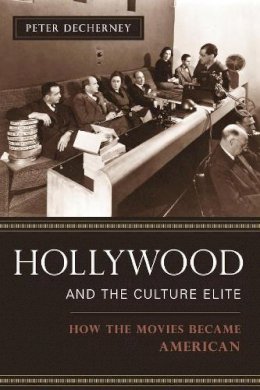
Stock image for illustration purposes only - book cover, edition or condition may vary.
Hollywood and the Culture Elite: How the Movies Became American
Peter Decherney
€ 46.08
FREE Delivery in Ireland
Description for Hollywood and the Culture Elite: How the Movies Became American
Paperback. Hollywood and cultural institutions worked together to insure their own survival and profitability and to provide a coherent, though shifting, American identity. This book explores how their needs coalesced and led to the development of a symbiotic relationship between the film industry and America's stewards of high culture. Series: Film and Culture Series. Num Pages: 272 pages, illustrations. BIC Classification: APF. Category: (P) Professional & Vocational. Dimension: 229 x 152 x 16. Weight in Grams: 499.
As Americans flocked to the movies during the first part of the twentieth century, the guardians of culture grew worried about their diminishing influence on American art, education, and American identity itself. Meanwhile, Hollywood studio heads were eager to stabilize their industry, solidify their place in mainstream society, and expand their new but tenuous hold on American popular culture. Peter Decherney explores how these needs coalesced and led to the development of a symbiotic relationship between the film industry and America's stewards of high culture. Formed during Hollywood's Golden Age (1915-1960), this unlikely partnership ultimately insured prominent places in American culture for both the movie industry and elite cultural institutions. It redefined Hollywood as an ideal American industry; it made movies an art form instead of simply entertainment for the masses; and it made moviegoing a vital civic institution. For their part, museums and universities used films to maintain their position as quintessential American institutions. As the book delves into the ties between Hollywood bigwigs and various cultural leaders, an intriguing cast of characters emerges, including the poet Vachel Lindsay, film producers Adolph Zukor and Joseph Kennedy, Hollywood flak and censor extraordinaire Will Hays, and philanthropist turned politician Nelson Rockefeller. Decherney considers how Columbia University's film studies program helped integrate Jewish students into American culture while also professionalizing screenwriting. He examines MoMA's career-savvy film curator Iris Barry, a British feminist once dedicated to stemming the tide of U.S. cultural imperialism, who ultimately worked with Hollywood and the U.S. government to fight fascism and communism and promote American values abroad. Other chapters explore Vachel Lindsay's progressive vision of movies as reinvigorating the public sphere through film libraries and museums; the promotion of movie connoisseurship at Harvard and other universities; and how the heir of a railroad magnate bankrolled the American avant-garde film movement. Amid ethnic diversity, the rise of mass entertainment, world war, and the global spread of American culture, Hollywood and cultural institutions worked together to insure their own survival and profitability and to provide a coherent, though shifting, American identity.
Product Details
Format
Paperback
Publication date
2006
Publisher
Columbia University Press United States
Number of pages
272
Condition
New
Series
Film and Culture Series
Number of Pages
272
Place of Publication
New York, United States
ISBN
9780231133777
SKU
V9780231133777
Shipping Time
Usually ships in 7 to 11 working days
Ref
99-1
About Peter Decherney
Peter Decherney is assistant professor of cinema studies and English at the University of Pennsylvania.
Reviews for Hollywood and the Culture Elite: How the Movies Became American
It is in the author's discussion of these Cold War happenings that the narrative becomes almost cloak-and-dagger. Publishers Weekly A clearly written and well-researched historical work that makes a strong contribution to film scholarship.
Heidi Kenaga The Moving Image A frequently profound ethical query into the costs of patronage.
Kevin Hagopian Film Quarterly Thought-provoking. The American Historical Review Decherney does an excellent job exploring the individual players... and exposing how our current cinematic institutions and assumptions regarding film were founded.
Erin Hills-Parks Film & History A very significant work that demands attentive and critical engagement.
Tom Crosbie Screening the Past
Heidi Kenaga The Moving Image A frequently profound ethical query into the costs of patronage.
Kevin Hagopian Film Quarterly Thought-provoking. The American Historical Review Decherney does an excellent job exploring the individual players... and exposing how our current cinematic institutions and assumptions regarding film were founded.
Erin Hills-Parks Film & History A very significant work that demands attentive and critical engagement.
Tom Crosbie Screening the Past
